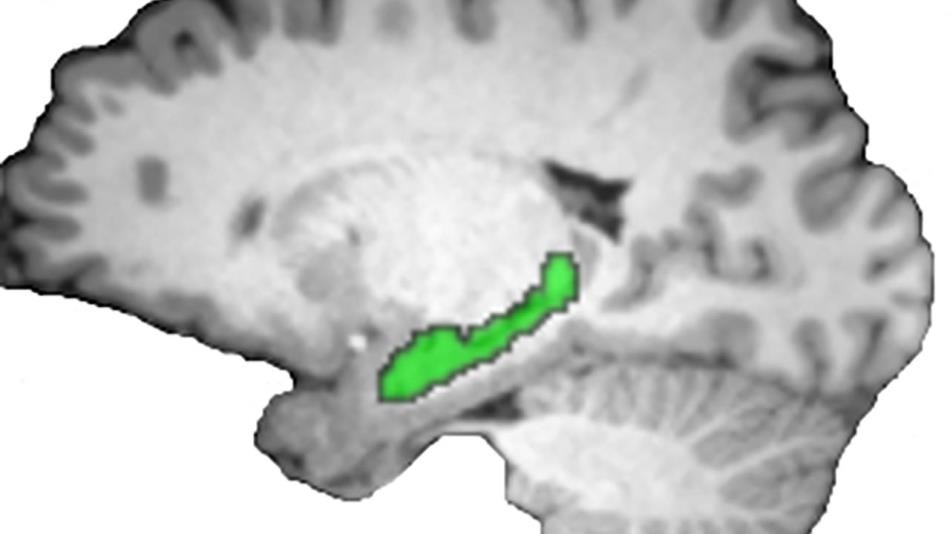People love stories. We find it easier to remember events when they are part of an overarching narrative. But in real life, the chapters of a story don't follow smoothly one from another. Other things happen in between. A new brain imaging study from the Center for Neuroscience at the University of California, Davis, shows that the hippocampus is the brain's storyteller, connecting separate, distant events into a single narrative. The work is published on Sept. 29 in Current Biology.

A new brain imaging study shows that the hippocampus (green) is the brain's master storyteller, weaving memories of past events into a coherent narrative. Image: Brendan Cohn-Sheehy, Center for Neuroscience
“Things that happen in real life don’t always connect directly, but we can remember the details of each event better if they form a coherent narrative,” said Brendan Cohn-Sheehy, an M.D./Ph.D. student at UC Davis and first author on the paper.
Cohn-Sheehy and colleagues at Professor Charan Ranganath's Dynamic Memory Laboratory at the Center for Neuroscience used functional MRI to image the hippocampus of volunteers as they learned and recalled a series of short stories.
The stories, created specifically for the study, featured main and side characters and an event. The stories were constructed so that some formed connected, two-part narratives and others did not.
The researchers played recordings of the stories to the volunteers in the fMRI scanner. The next day, they scanned them again as the volunteers recalled the stories. The researchers compared the patterns of activity in the hippocampus between learning and recalling the different stories.
As expected, they saw more similarity for learning pieces of a coherent story than for stories that did not connect. The results show the coherent memories being woven together, Cohn-Sheehy said.
"When you get to the second event, you're reaching back to the first event and embedding part of it in the new memory," he said.
Hippocampus weaves memories
Next, they compared hippocampal patterns during learning and retrieval. They found that when recalling stories that formed a coherent narrative, the hippocampus activates more information about the second event than when recalling non-connected stories.
"The second event is where the hippocampus is forming a connected memory," Cohn-Sheehy said.
When the researchers tested the volunteers' memory of stories, they found that the ability to bring back hippocampal activity of the second event was linked to the amount of detail the volunteers could recall.
While other parts of the brain are involved in the process of memory, the hippocampus appears to bring pieces together across time and form them into connected, narrative memories, Cohn-Sheehy said.
The work is part of a new era in memory research. Traditionally, in neuroscience, researchers have studied the basic processes of memory involving disconnected pieces of information, whereas psychology has a tradition of studying how memory works to capture and connect events in the "real world." These two camps are starting to merge, Cohn-Sheehy said.
We're using brain imaging to get at realistic memory processes."
Brendan Cohn-Sheehy, M.D./Ph.D. Student, UC Davis
Research on memory processes could ultimately lead to better clinical tests for early stages of memory decline in aging or dementia, or for assessing damage to memory from brain injuries.
Source:
Journal reference:
Cohn-Sheehy, B. I., et al. (2021) The hippocampus constructs narrative memories across distant events. Current Biology. doi.org/10.1016/j.cub.2021.09.013.